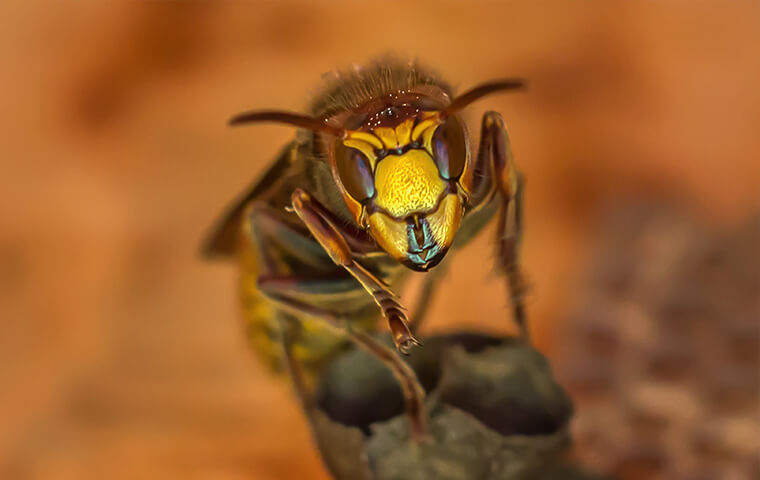Wasps
What are wasps?
Wasps are a type of stinging insect that are classified as either social or solitary. Social wasps live in large colonies with numbers in the thousands. Solitary wasps are those species that nest in individual nests. Most species of wasps are predatory and feed on various species of nuisance insects, while some feed on pollen and nectar, and are responsible for the pollination of some crops and plants. Most wasps can be identified by their pinched waists, two pairs of wings, and six legs that hang down when in flight. Wasps tend to have very little or no body hair.

The most common species of wasps found in New Jersey, eastern Pennsylvania, and northern Delaware include yellow jackets, hornets, and carpenter bees.
Yellow jackets
Yellow jackets are extremely social and live together in very large colonies. Their faces and heads are a combination of black and yellow colors, and their bodies have a clear, yellow-and-black-striped pattern on them.
Hornets
Hornets are typically black and white or brownish-red in color. They are predators and feed on other insects. Hornets have the potential to become very aggressive when they feel disturbed or threatened.
Carpenter bees
Carpenter bees are an example of a solitary species of stinging insect. They have smooth, shiny abdomens that are completely black. Adults are large in size, and are black and yellow in color.
Are wasps dangerous?
Yes, wasps have the potential to be very dangerous pests, especially when they decide to build their nests in, on, or near your home. Wasps have smooth stingers which allow them to sting their victims repeatedly. Their stings are extremely painful, and their venom is powerful enough to trigger serious health problems in people. Wasp venom can trigger allergic reactions, and even life-threatening anaphylaxis in people.
Why do I have a wasp problem?
Wasps are attracted to properties that offer them food, water, and nesting sites. Wasps feed on a variety of matter, including insects, proteins, nectar, sweets, and honeydew. Open garbage cans, compost piles, outdoor eating areas, gardens, flowering vegetation, clogged gutters, birdbaths, or ponds can all attract stinging insects to your property.
Where will I find wasps?
Aerial nesters, such as hornets, place their nests in trees, shrubs, utility poles, porches, or underneath rooflines, decks, and door frames. Ground nesters, such as yellow jackets, usually create nests in the abandoned ground holes of small animals, under woodpiles, or underneath shrubs and bushes. Carpenter bees create their solitary nests inside of pieces of wood, preferring older or untreated wood. Fences, decks, porches, wooden playsets, and wooden trim are all common nesting spots for carpenter bees. If wasps find their way inside of a home, they will nest in the chimney, attic, wall voids, or crawlspaces.
How do I get rid of wasps?
To eliminate current problems with wasps, as well as prevent future ones, it is best to partner with an experienced professional. At Bugaboo Pest Control, our professionals provide customers with the residential or commercial pest control services needed to solve your unique wasp problem. To learn more about our full-service extermination services that are offered throughout New Jersey, eastern Pennsylvania, and northern Delaware, contact Bugaboo Pest Control today!
How can I prevent wasps in the future?
Wasps in New Jersey and the surrounding area create an imposing presence on your property, but the following tips can deter them from your home or business:
- Place vegetable gardens and woodpiles away from the exterior of your home.
- Keep tight-fitting lids on all trash cans, recycling bins, and compost bins.
- Stain or paint wooden structures on your property.
- Keep outdoor eating areas cleaned up.
- Eliminate or seal as many entry points into your building as possible.
- Eliminate water sources by maintaining gutters and fixing leaky outdoor fixtures.
- Trim back tree limbs, bushes, and shrubs away from the exterior of your home.

